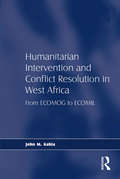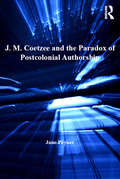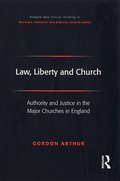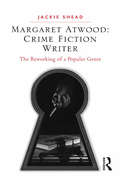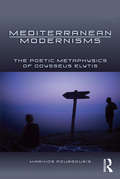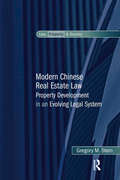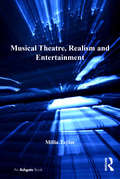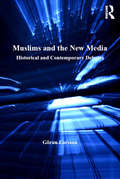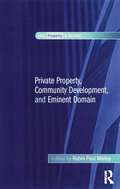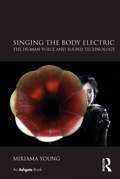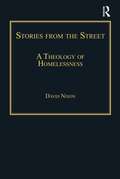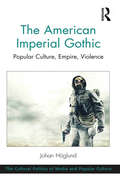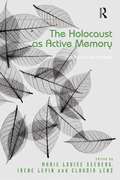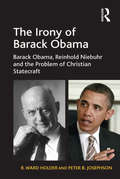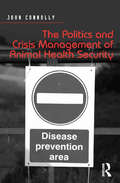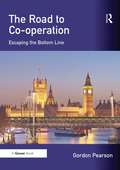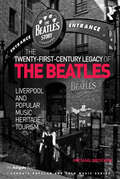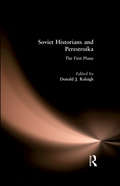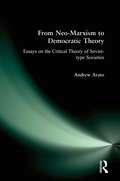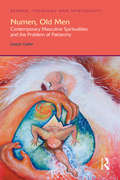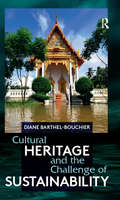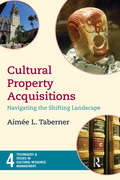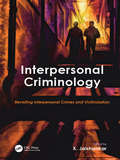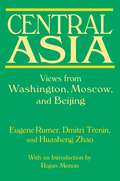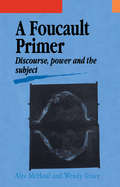Special Collections
Benetech’s Global Certified Accessible Titles
Description: Benetech’s GCA program is the first independent third-party EPUB certification to verify ebook accessibility. By creating content that is born accessible, publishers can meet the needs of all readers. Learn more: https://bornaccessible.benetech.org/
- Table View
- List View
Humanitarian Intervention and Conflict Resolution in West Africa
by John M. KabiaThe end of the Cold War has been characterized by a wave of violent civil wars that have produced unprecedented humanitarian catastrophe and suffering. Although mostly intra-state, these conflicts have spread across borders and threatened international peace and security. One of the worst affected regions is West Africa which has been home to some of Africa's most brutal and intractable conflicts for more than a decade. This volume locates the peacekeeping operations of the Economic Community of West African States (ECOWAS) within an expanded post-Cold War conceptualization of humanitarian intervention. It examines the organization's capacity to protect civilians at risk in civil conflicts and to facilitate the processes of peacemaking and post-war peace-building. Taking the empirical case of ECOWAS, the book looks at the challenges posed by complex political emergencies (CPEs) to humanitarian intervention and traces the evolution of ECOWAS from an economic integration project to a security organization, examining the challenges inherent in such a transition.
J.M. Coetzee and the Paradox of Postcolonial Authorship
by Jane PoynerIn her analysis of the South African novelist J. M. Coetzee's literary and intellectual career, Jane Poyner illuminates the author's abiding preoccupation with what Poyner calls the "paradox of postcolonial authorship". Writers of conscience or conscience-stricken writers of the kind Coetzee portrays, whilst striving symbolically to bring the stories of the marginal and the oppressed to light, always risk reimposing the very authority they seek to challenge. From Dusklands to Diary of a Bad Year, Poyner traces how Coetzee rehearses and revises his understanding of the ethics of intellectualism in parallel with the emergence of the "new South Africa". She contends that Coetzee's modernist aesthetics facilitate a more exacting critique of the problems that encumber postcolonial authorship, including the authority it necessarily engenders. Poyner is attentive to the ways Coetzee's writing addresses the writer's proper role with respect to the changing ethical demands of contemporary political life. Theoretically sophisticated and accessible, her book is a major contribution to our understanding of the Nobel Laureate and to postcolonial studies.
Law, Liberty and Church
by Gordon ArthurLaw, Liberty and Church examines the presuppositions that underlie authority in the five largest Churches in England - the Church of England, the Roman Catholic Church, the Methodist Church, the United Reformed Church and the Baptist Union. Examining what has influenced their development, and how the patterns of authority that exist today have evolved, Gordon Arthur explores the contributions of Scripture, Roman Legal Theory, and Greek Philosophy. This book shows how the influence of Roman legal theory has caused inflexibility, and at times authoritarianism in the Roman Catholic Church; it explores how the influence of reason and moderation has led the Church of England to focus on inclusiveness, often at the cost of clarity; it expounds the attempts of the Free Churches to establish liberty of conscience, leading them at times to a more democratic and individualistic approach. Finally Arthur offers an alternative view of authority, and sets out some of the challenges this view presents to the Churches.
Margaret Atwood
by Jackie SheadExploring how Margaret Atwood’s fiction reimagines the figure of the detective and the nature of crime, Jackie Shead shows how the author radically reworks the crime fiction genre. Shead focuses on Surfacing, Bodily Harm, Alias Grace, The Blind Assassin, Oryx and Crake and selected short fiction, showing the ways in which Atwood’s protagonists are confronted by their own collusion in hegemonic assumptions and thus are motivated to investigate and expose crimes of gender, class and colonialism. Shead begins with a discussion of how Atwood’s treatment of crime fiction’s generic elements, particularly those of the whodunit, clue puzzle and spy thriller, departs from convention. Through discussion of Atwood’s metafictive strategies, Shead also examines Atwood’s techniques for activating her readers as investigators who are offered an educative process parallel to that experienced by some of the author’s protagonists. This book also marks a significant intervention in an ongoing debate among Atwood critics that pits the author’s postmodernism against her ethical and humanistic concerns.
Mediterranean Modernisms
by Marinos PourgourisEngaging with the work of Nobel Prize-winning poet Odysseus Elytis within the framework of international modernism, Marinos Pourgouris places the poet's work in the context of other modernist and surrealist writers in Europe. At the same time, Pourgouris puts forward a redefinition of European Modernism that makes the Mediterranean, and Greece in particular, the discursive contact zone and incorporates neglected elements such as national identity and geography. Beginning with an examination of Greek Modernism, Pourgouris's study places Elytis in conversation with Albert Camus; analyzes the influence of Charles Baudelaire, Gaston Bachelard, and Sigmund Freud on Elytis's theory of analogies; traces the symbol of the sun in Elytis's poetry by way of the philosophies of Heraclitus and Plotinus; examines the influence of Le Corbusier on Elytis's theory of architectural poetics; and takes up the subject of Elytis's application of his theory of Solar Metaphysics to poetic form in the context of works by Freud, C. G. Jung, and Michel Foucault. Informed by extensive research in the United States and Europe, Pourgouris's study makes a compelling contribution to the comparative study of Greek modernism, the Mediterranean, and the work of Odysseus Elytis.
Modern Chinese Real Estate Law
by Gregory M. SteinWith massive growth taking place in the real estate industry, how can China develop a free market and private ownership of land while still officially subscribing to Communist ideology? This study uses fieldwork interviews to establish how the Chinese real estate market operates in practice from both legal and business perspectives. It describes how the market functions, which laws are applicable and how they are applied, and how a nation can achieve dramatic economic growth so rapidly while its legal system is so unsettled. The book demonstrates how China is drawing on the world for ideas while retaining a domestic system that remains essentially Chinese, and how the recent revitalization of China's real estate market has confounded the predictions of many developments economists.
Musical Theatre, Realism and Entertainment
by Millie TaylorWhat is it about musical theatre that audiences find entertaining? What are the features that lead to its ability to stimulate emotional attachment, to move and to give pleasure? Beginning from the passion musical theatre performances arouse and their ubiquity in London's West End and on Broadway this book explores the ways in which musical theatre reaches out to and involves its audiences. It investigates how pleasure is stimulated by vocal, musical and spectacular performances. Early discussions centre on the construction of the composed text, but then attention is given to performance and audience response. Musical theatre contains disruptions and dissonances in its multiple texts, it allows gaps for audiences to read playfully. This combines with the voluptuous sensations of embodied emotion, contagiously and viscerally shared between audience and stage, and augmented through the presence of voice and music. A number of features are discovered in the construction of musical theatre performance texts that allow them to engage the intense emotional attachment of their audiences and so achieve enormous popularity. In doing this, the book challenges the conception of musical theatre as 'only entertainment'. Entertainment instead becomes a desirable, ephemeral and playful concept.
Muslims and the New Media
by Göran LarssonScholars from an extensive range of academic disciplines have focused on Islam in cyberspace and the media, but there are few historical studies that have outlined how Muslim 'ulama' have discussed and debated the introduction and impact of these new media. Muslims and the New Media explores how the introduction of the latest information and communication technologies are mirroring changes and developments within society, as well as the Middle East's relationship to the West. Examining how reformist and conservative Muslim 'ulama' have discussed the printing press, photography, the broadcasting media (radio and television), the cinema, the telephone and the Internet, case studies provide a contextual background to the historical, social and cultural situations that have influenced theological discussions; focusing on how the 'ulama' have debated the 'usefulness' or 'dangers' of the information and communication media. By including both historical and contemporary examples, this book exposes historical trajectories as well as different (and often contested) positions in the Islamic debate about the new media.
Private Property, Community Development, and Eminent Domain
by Robin Paul MalloyThe contributors in this volume address the fundamental relationship between the state and its citizens, and among the people themselves. Discussion centers on a recent decision by the United States Supreme Court in the case of Kelo v. City of New London. This case involved the use of eminent domain power to acquire private property for purposes of transferring it by the State to another private party that would make "better" economic use of the land. This type of state action has been identified as an "economic development taking". In the Kelo case, the Court held that the action was legal within provisions of the US Constitution but the opinion was contentious among some of the Justices and has been met with significant negative outcry from the public. The Kelo case and the public debate arising in its aftermath give cause to assess the legal landscape related to the ability of government to fairly balance the tension between private property and the public interest. The tension and the need to successfully strike a balance are not unique to any one country or any one political system. From the United States to the United Kingdom, to the People's Republic of China, property and its legal regulation are of prime importance to matters of economic development and civic institution building. The Kelo decision, therefore, explores a rich set of legal principles with broad applicability.
Singing the Body Electric
by Miriama YoungSinging the Body Electric explores the relationship between the human voice and technology, offering startling insights into the ways in which technological mediation affects our understanding of the voice, and more generally, the human body. From the phonautograph to magnetic tape and now to digital sampling, Miriama Young visits particular musical and literary works that define a century-and-a-half of recorded sound. She discusses the way in which the human voice is captured, transformed or synthesised through technology. This includes the sampled voice, the mechanical voice, the technologically modified voice, the pliable voice of the digital era, and the phenomenon by which humans mimic the sounding traits of the machine. The book draws from key electro-vocal works spanning a range of genres - from Luciano Berio's Thema: Omaggio a Joyce to Radiohead, from Alvin Lucier's I Am Sitting in a Room, to Björk, and from Pierre Henry's Variations on a Door and a Sigh to Christian Marclay's Maria Callas. In essence, this book transcends time and musical style to reflect on the way in which the machine transforms our experience of the voice. The chapters are interpolated by conversations with five composers who work creatively with the voice and technology: Trevor Wishart, Katharine Norman, Paul Lansky, Eduardo Miranda and Bora Yoon. This book is an interdisciplinary enterprise that combines music aesthetics and musical analysis with literature and philosophy.
Stories from the Street
by David NixonStories from the Street is a theological exploration of interviews with men and women who had experienced homelessness at some stage in their lives. Framed within a theology of story and a theology of liberation, Nixon suggests that story is not only a vehicle for creating human transformation but it is one of God's chosen means of effecting change. Short biographies of twelve characters are examined under themes including: crises in health and relationships, self-harm and suicide, anger and pain, God and the Bible. Expanding the existing literature of contextual theology, this book provides an alternative focus to a church-shaped mission by advocating with, and for, a very marginal group; suggesting that their experiences have much to teach the church. Churches are perceived as being active in terms of pastoral work, but reluctant to ask more profound questions about why homelessness exists at all. A theology of homelessness suggests not just a God of the homeless, but a homeless God, who shares stories and provides hope. Engaging with contemporary political and cultural debates about poverty, housing and public spending, Nixon presents a unique theological exploration of homeless people, suffering, hope and the human condition.
The American Imperial Gothic
by Johan HoglundThe imagination of the early twenty-first century is catastrophic, with Hollywood blockbusters, novels, computer games, popular music, art and even political speeches all depicting a world consumed by vampires, zombies, meteors, aliens from outer space, disease, crazed terrorists and mad scientists. These frequently gothic descriptions of the apocalypse not only commodify fear itself; they articulate and even help produce imperialism. Building on, and often retelling, the British ’imperial gothic’ of the late nineteenth century, the American imperial gothic is obsessed with race, gender, degeneration and invasion, with the destruction of society, the collapse of modernity and the disintegration of capitalism. Drawing on a rich array of texts from a long history of the gothic, this book contends that the doom faced by the world in popular culture is related to the current global instability, renegotiation of worldwide power and the American bid for hegemony that goes back to the beginning of the Republic and which have given shape to the first decade of the millennium. From the frontier gothic of Charles Brockden Brown's Edgar Huntly to the apocalyptic torture porn of Eli Roth's Hostel, the American imperial gothic dramatises the desires and anxieties of empire. Revealing the ways in which images of destruction and social upheaval both query the violence with which the US has asserted itself locally and globally, and feed the longing for stable imperial structures, this book will be of interest to scholars and students of popular culture, cultural and media studies, literary and visual studies and sociology.
The Holocaust as Active Memory
by Irene LevinThe ways in which memories of the Holocaust have been communicated, represented and used have changed dramatically over the years. From such memories being neglected and silenced in most of Europe until the 1970s, each country has subsequently gone through a process of cultural, political and pedagogical awareness-rising. This culminated in the ’Stockholm conference on Holocaust commemoration’ in 2000, which resulted in the constitution of a task force dedicated to transmitting and teaching knowledge and awareness about the Holocaust on a global scale. The silence surrounding private memories of the Holocaust has also been challenged in many families. What are the catalysts that trigger a change from silence to discussion of the Holocaust? What happens when we talk its invisibility away? How are memories of the Holocaust reflected in different social environments? Who asks questions about memories of the Holocaust, and which answers do they find, at which point in time and from which past and present positions related to their societies and to the phenomenon in question? This book highlights the contexts in which such questions are asked. By introducing the concept of ’active memory’, this book contributes to recent developments in memory studies, where memory is increasingly viewed not in isolation but as a dynamic and relational part of human lives.
The Irony of Barack Obama
by R. Ward Holder and Peter B. JosephsonDrawing on the political theology of Reinhold Niebuhr, described by Barack Obama as 'one of my favourite philosophers', this book assesses the challenges facing the President during his first term. It evaluates his success in adhering to Niebuhr's path of 'Christian realism' when faced with the pragmatic demands of domestic and foreign affairs. In 2008 Candidate Obama used the ideas of 'Hope' and 'Change' to inspire voters and secure the presidency. Obama promised change not only regarding America's policies, but even more fundamentally in the nation's political culture. Holder and Josephson describe the foundations of President Obama's Christian faith and the extent to which it has shaped his approach to politics. Their book explores Obama's journey of faith in the context of a broadly Augustinian understanding of faith and politics, examines the tensions between Christian realism and pragmatic progressivism, explains why a Christian realist interpretation is essential to understanding Obama's presidency, and applies this model of understanding to considerations of foreign and domestic policy. By combining this theological and political analysis the book offers a special opportunity to reflect on the relationship between Christian faith and statesmanship, reflections that are missing from current popular discussions of the Obama presidency. Through consideration of Niebuhr's models of the prophet and the statesman, and the more popular alternative of the political evangelist, Holder and Josephson are better able to explain the president's successes and his failures, and to unveil the Augustinian limits of the political life.
The Politics and Crisis Management of Animal Health Security
by John ConnollyThe Politics and Crisis Management of Animal Health Security addresses the 2001 foot and mouth epidemic in the United Kingdom - one of, if not the, most significant crises ever to face the UK farming industry. Underpinned by interviews with politicians and bureaucrats and with significant primary documentary analysis the book shows that the crisis was a critical juncture in how disease outbreaks have been planned and managed ever since. The author explores how this event affected policy and governance arrangements for managing subsequent disease-induced threats (such as avian influenza and bovine TB) and concludes by considering the ’temporality’ of lesson learning by the UK government including the current and future challenges associated with managing incongruent risks (e.g., flood protection, swine flu and Ebola). This book provides students of public policy and administration with a significant illustration of how key concepts and analytical lenses from public policy can be applied to the study of the contours of practical policy change.
The Road to Co-operation
by Gordon PearsonThis critical and informed protest against the absurdity and dishonesty of neoclassical economic theory as it has progressed through the 20th century down to the present, sheds new light on the predicament faced in 2012. In The Road to Co-operation, Pearson highlights the dangers of using unrealistic mathematical models of human, organisational and market behaviour to guide policy prescriptions. He shows the damage done to real economies, markets, firms and people, by the unwarranted trust in unregulated markets, proclaimed by Friedman and colleagues, promulgated by academia and adopted by the financial-political-corporate nexus, now dominant in Anglo-American jurisdictions. Though real markets work better than known alternatives, Pearson makes the crucial distinction between the real and the speculative-financial, where totally different realities apply. Failure to make that distinction has transformed financial sectors from supportive of the real economy, to exploitative and sometimes fraudulent. Pearson provides a comparative analysis of corporate governance theory, law, and practice in different jurisdictions, including the self-destruction of post-mature Anglo-American governance with the more robust custom and practice in the industrial economies of Germany and Japan and emerging economies of China and India, which all exercise care for their real economic strengths and provide object lessons for governance in UK and US. The Road to Co-operation proposes realistic changes in policy and practice, in the context of sustainability, which would be prerequisite to recapturing real long term economic success on a co-operative and non-exploitative foundation. It will be invaluable for today's business faculty, students and practitioners as well as the 'madmen in authority'.
The Twenty-First-Century Legacy of the Beatles
by Michael BrockenIt has taken Liverpool almost half a century to come to terms with the musical, cultural and now economic legacy of the Beatles and popular music. At times the group was negatively associated with sex and drugs images surrounding rock music: deemed unacceptable by the city fathers, and unworthy of their support. Liverpudlian musicians believe that the musical legacy of the Beatles can be a burden, especially when the British music industry continues to brand the latest (white) male group to emerge from Liverpool as ’the next Beatles’. Furthermore, Liverpudlians of perhaps differing ethnicities find images of ’four white boys with guitars and drums’ not only problematic in a ’musical roots’ sense, but for them culturally devoid of meaning and musically generic. The musical and cultural legacy of the Beatles remains complex. In a post-industrial setting in which both popular and traditional heritage tourism have emerged as providers of regular employment on Merseyside, major players in what might be described as a Beatles music tourism industry have constructed new interpretations of the past and placed these in such an order as to re-confirm, re-create and re-work the city as a symbolic place that both authentically and contextually represents the Beatles.
Soviet Historians and Perestroika
by Donald J. RaleighThe Soviet historical profession is in ferment. For decades it was relegated to the task of obfuscating the past, gilding the status quo and papering over the "blank spots" in Soviet history - events that defied even the most brazen attempts at falsification. Today it is engaged in an often painful process of self-examination. Initially rather timid, the internal discussion was soon propelled by external events - the scuttling of history textbooks, official disclosures of formerly "classified" facts and the explosion of candour in the depictions of the past in memoirs, journalistic writing and fiction. This volume gives voice to the lead actors in the "first phase" of this process - the senior historians, their journalistic "challengers" and those charged with responsiblity for the institutions of research, training and publication in the field of history.
From Neo-Marxism to Democratic Theory
by Andrew AratoThe essays in this volume trace an intellectual odyssey, a search for a genuinely critical theory. The book begins with the question of why the Frankfurt School as well as other neo-Marxist and post-Marxist analysts, both in the West and in dissident circles in the East, failed to produce a critical theory of Soviet socialism or to establish a dynamic relationship with contemporary social movements. As the political struggle in Eastern Europe intensified, the author of this book disengaged from his own efforts to reconstruct a critical Marxism. Instead, he attempts a reconstruction of democratic theory based on civil society rather than class categories, and with a critical relevance not only to the transition from state socialism but more generally to the universal goal of emancipation.
Numen, Old Men
by Joseph GelferSince the early 1990s there have been various movements designed to encourage 'masculine spirituality'. All these movements share a concern that spirituality has become too feminine and that men's experiences of the spiritual are being marginalized. The task of masculine spirituality is to promote 'authentic' masculine characteristics within a spiritual context. Numen, Old Men examines these characteristics to argue that masculine spirituality is thinly veiled patriarchy. The mythopoetic, evangelical, and Catholic men's movements are shown to promote a hetero-patriarchal spirituality by appealing to either combative and oppressive neo-Jungian archetypes or biblical models of man as the leader of the family. Numen, Old Men examines spiritualities that aim to honour and transcend both the masculine and feminine, and offers gay spirituality as an example of masculine spirituality that resists patriarchy.
Cultural Heritage and the Challenge of Sustainability
by Diane Barthel-BouchierFor cultural and heritage institutions around the world, sustainability is the major challenge of the twenty-first century. In the first major work to analyze this critical issue, Barthel-Bouchier argues that programmatic commitments to sustainability arose both from direct environmental threats to tangible and intangible heritage, and from social and economic contradictions as heritage developed into a truly global organizational field. Drawing on extensive fieldwork and interviews over many years, as well as detailed coverage of primary documents and secondary literature, she examines key international organizations including UNESCO, ICOMOS, and the World Monuments Fund, and national trust organizations of Great Britain, the United States, and Australia, and many others. This wide-ranging study establishes a foundation for critical analysis and programmatic advances as heritage professionals encounter the growing challenge of sustainability.
Cultural Property Acquisitions
by Aimée L TabernerMuseum staff--whether new to the field or working with collections for decades--are often overwhelmed by the complexities of acquiring cultural property, particularly antiquities and archaeological material. Collecting practices now require a greater degree of transparency and cooperation with various stakeholders than in the past, and are under greater scrutiny to be in line with current legal requirements and ethical expectations. This book provides a concise, unbiased, and practical resource for those tasked with navigating the complicated and rapidly changing legal and ethical landscape governing the acquisition of cultural property and archaeological material.
Interpersonal Criminology
by K. JaishankarBased on peer-reviewed articles from the Second International Conference of the South Asian Society of Criminology and Victimology, Interpersonal Criminology investigates the roots of crime and victimization, rather than dissecting criminal behavior after the fact. The book divides crime by type, covering crimes against women, crimes against children and youths, culture conflict and victimization of groups, and interpersonal cybercrimes. Perfect for criminal justice practitioners and advanced human rights, criminology, and victimology students, Interpersonal Criminology explores the complexities of crime and interpersonal events in both established and emerging fields of criminology, including those concerning women and minorities.
Central Asia
by Dmitri Trenin and Eugene B. Rumer and Huasheng ZhaoThe disintegration of the Soviet Union in 1991 rapidly and irrevocably transformed Central Asia's political landscape. This region of five sovereign states with a population of some fifty million people quickly became a major focus of interest and influence for competing poles of power. The eminent contributors to this volume offer a four-part analysis of the region's new importance in world affairs. Rajan Menon examines the place of Central Asia in a global perspective. Eugene Rumer considers the perspective of the post-9/11 United States. Dimitri Trenin looks at the region from the standpoint of traditional hegemon Russia. Huasheng Zhao provides the view from economic superpower-in-the-making China.
A Foucault Primer
by Alec McHoul and Wendy GraceWho are we today? That deceptively simple question continued to be asked by the French historian and philosopher, Michel Foucault, who for the last three decades has had a profound influence on English-speaking scholars in the humanities and social sciences.; This text is designed for undergraduates and others who feel in need of some assistance when coming to grips with Foucault's voluminous and complex writings. Instead of dealing with them chronologically, however, this book concentrates on some of their central concepts, primarily Foucault's rethinking of the categories of "discourse", "power", and " the subject".; Foucault's writings contribute collectively to what he himself calls "an ontology of the present". His historical research was always geared towards showing how things could have been and still could be otherwise. This is especially the case with respect to the production of human subjects.
